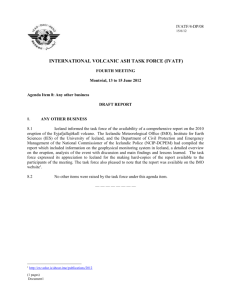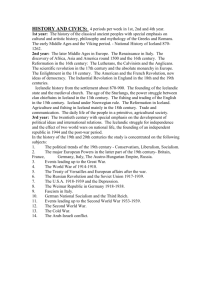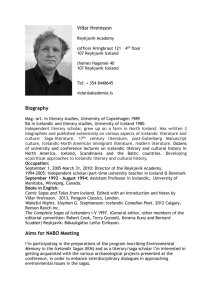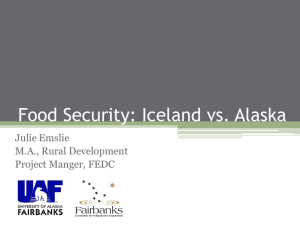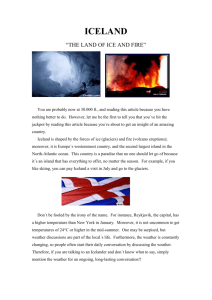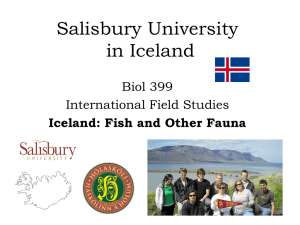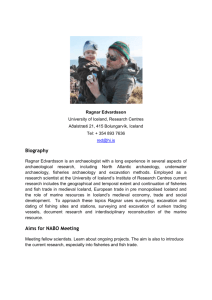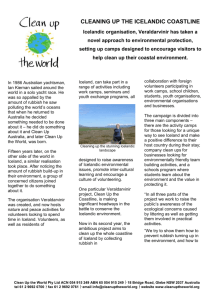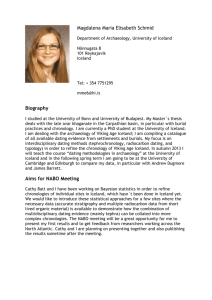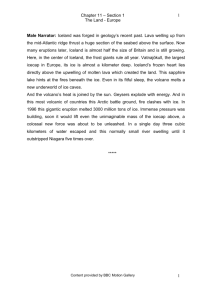Individual Freedom and the Problem of Hate Speech
advertisement
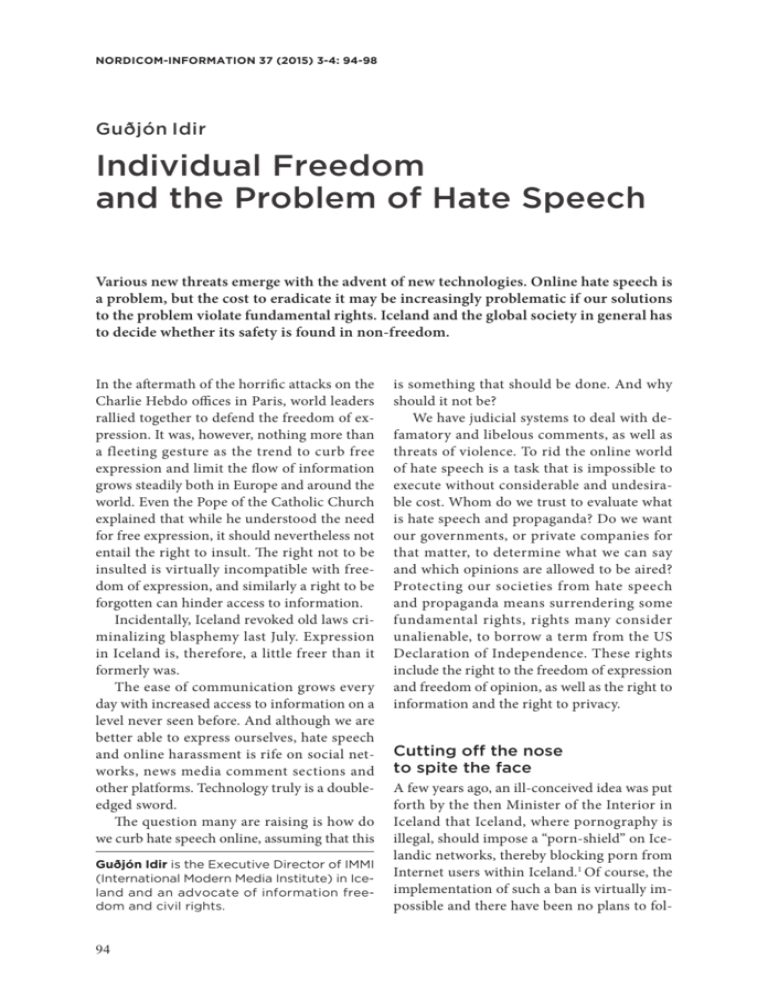
NORDICOM-INFORMATION 37 (2015) 3-4: 94-98 Guðjón Idir Individual Freedom and the Problem of Hate Speech Various new threats emerge with the advent of new technologies. Online hate speech is a problem, but the cost to eradicate it may be increasingly problematic if our solutions to the problem violate fundamental rights. Iceland and the global society in general has to decide whether its safety is found in non-freedom. In the aftermath of the horrific attacks on the Charlie Hebdo offices in Paris, world leaders rallied together to defend the freedom of expression. It was, however, nothing more than a fleeting gesture as the trend to curb free expression and limit the flow of information grows steadily both in Europe and around the world. Even the Pope of the Catholic Church explained that while he understood the need for free expression, it should nevertheless not entail the right to insult. The right not to be insulted is virtually incompatible with freedom of expression, and similarly a right to be forgotten can hinder access to information. Incidentally, Iceland revoked old laws criminalizing blasphemy last July. Expression in Iceland is, therefore, a little freer than it formerly was. The ease of communication grows every day with increased access to information on a level never seen before. And although we are better able to express ourselves, hate speech and online harassment is rife on social networks, news media comment sections and other platforms. Technology truly is a doubleedged sword. The question many are raising is how do we curb hate speech online, assuming that this Guðjón Idir is the Executive Director of IMMI (International Modern Media Institute) in Iceland and an advocate of information freedom and civil rights. 94 is something that should be done. And why should it not be? We have judicial systems to deal with defamatory and libelous comments, as well as threats of violence. To rid the online world of hate speech is a task that is impossible to execute without considerable and undesirable cost. Whom do we trust to evaluate what is hate speech and propaganda? Do we want our governments, or private companies for that matter, to determine what we can say and which opinions are allowed to be aired? Protecting our societies from hate speech and propaganda means surrendering some fundamental rights, rights many consider unalienable, to borrow a term from the US Declaration of Independence. These rights include the right to the freedom of expression and freedom of opinion, as well as the right to information and the right to privacy. Cutting off the nose to spite the face A few years ago, an ill-conceived idea was put forth by the then Minister of the Interior in Iceland that Iceland, where pornography is illegal, should impose a “porn-shield” on Icelandic networks, thereby blocking porn from Internet users within Iceland.1 Of course, the implementation of such a ban is virtually impossible and there have been no plans to fol- Guðjón Idir low through with this, but it does nonetheless show two things – first, that our legislators often do not understand the nature of the Internet and the digital era, and secondly, that the mentality of cutting off the nose to spite the face is very much widespread when dealing with online issues. The same can be said about the concept of mass surveillance operations – it is a grossly disproportional policy by which the privacy of the global population is violated to retroactively investigate the very few, or at least that is what its proponents contend. Blanket policies, such as mass surveillance, do more harm than good. The criminalization of hate speech and propaganda is an act which stems from the same mentality, and is illustrative of a black and white worldview with little flexibility of thought or sense for practical reality. But mass surveillance is not the only draconian affront to our democracies as the war against freedom of information and freedom of expression escalates, with governments pushing for limitations on free expression around the world resulting in the imprisonment of journalists, bloggers and human rights activists and the subsequent chilling effects of these actions.2 Intermediaries, such as social media networks and ISPs are, in certain places, being made accountable for content uploaded by third parties, and are required to monitor traffic and content. The roles of both overseer and censor are thrust upon private companies to censor content, bypassing the only real instrument meaningful democracies have to determine judgement in such matters – the judicial system. Without judicial procedure, transparency and accountability are lost. Private companies have been co-opted into the mass surveillance industry and are now being pushed to censor the Internet. Who should censor? A website was hosted on an Icelandic domain promoting ISIS propaganda. The Prime Minister was quick to explain in the media that this should not happen in Iceland. The company that processes domain registrations in Iceland took down the website after much in-house debate, surely feeling political pressure to act. The correct channel for the matter was, of course, the judicial system which remained unutilized. Child pornography, terrorist threats and other threats of violence are illegal. However, information which is not by its very nature illegal, should be accessible if we want a free Internet where free expression exists regardless of whether said information is insulting or we find the opinions expressed disagreeable. If individuals, groups or companies feel unfairly targeted, the right procedure to follow is, again, through the judicial system. Defamation law, however, can also be abused to control the flow of information and the International Press Institute has been at pains to highlight that defamation law should not be within countries’ criminal code, but rather within civil procedure, thus avoiding the possibility of imprisonment for journalists or anyone else on the grounds of expression.3 Hate speech – a reflection of society, not a new frontier In Iceland, hate speech is common in a variety of discussions, be it on social media or the comment sections of online news media. Discussions of feminism, refugees and gay rights all attract certain groups and individuals fuelled by hatred and prejudice. But do we prefer those views to be hidden under the surface or do we want those views to be out in the open, to be open to debate? It would be naive to suppose that those views exist because people are so easily influenced that when they come across them, they instantly adopt them. That mentality is at odds with openness and is firmly in the camp of rigid paternalism to which the digital era with its overflow of information is very much a threat. It is our best hope yet for decentralized power, for access to information and decision making. The more information we have, the better equipped we are to form opinions. When it comes to propaganda, we have to believe that individuals can choose for themselves. If propaganda is to be outlawed, we will need to overhaul our own media as we have seen particular narratives 95 Nordicom-Information 37 (2015) 3-4 dominate news discussions, and only limited points of view be presented. When individuals are threatened, or defamatory comments are made about them, charges can be brought against those performing these acts. Freedom of expression is constitutionally protected in Iceland, but that freedom carries with it a level of responsibility: Everyone has the right to freedom of opinion and belief. Everyone shall be free to express his thoughts, but shall also be liable to answer for them in court. The law may never provide for censorship or other similar limitations to freedom of expression. Freedom of expression may only be restricted by law in the interests of public order or the security of the State, for the protection of health or morals, or for the protection of the rights or reputation of others, if such restrictions are deemed necessary and in agreement with democratic traditions.4 Hate speech has actually promoted much needed debate and anyone airing racist, misogynistic and/or homophobic views runs the risk of ridicule. A case in point is the local celebrity who publicly bemoans the annual Gay Pride parade which he feels is a bad influence on children; this has left him to be seen as a bit of an online village idiot. With power comes responsibility What we can do is hold politicians and journalists to account when they stoke hatred and mistrust of minorities. In Iceland, we have seen a government MP virtually call for racial profiling by suggesting that all Muslims in Iceland should be investigated for terrorist links.5 We have seen a year long episode of cover-up and political manipulation after investigative reporting began into a ministerial leak to the papers defaming a defenseless asylum seeker, which subsequently resulted in a Minister’s aide being charged and found guilty of misconduct. And in the last city 96 council elections we saw one of the incumbent political parties test-drive xenophobic views in a desperate attempt to gain votes. It worked, resulting in two seats out of fifteen.6 Politicians within the Icelandic government (including the Prime Minister) have also called for newspapers that “understand them”, for a less critical public debate and for more positive reporting. Incidentally, we have seen a hostile takeover of one major newspaper by people favourable to the Icelandic government – a newspaper that, prior to the takeover, was at the forefront of investigative journalism in Iceland.7 And the oldest newspaper in Iceland, Morgunblaðið, operating at a loss and having had massive debts cancelled, has as its editor the former Prime Minister of Iceland, who was also head of the Icelandic Central Bank in the build up to the country’s financial crisis. Morgunblaðið has continually undermined the plight of refugees and cast them in an unfavourable light, with the last example being when the paper’s cartoonist labeled Syrian refugees “holocaust tourists”. The media environment in Iceland is far from perfect, as in most places. Journalists are, however, quite safe, unlike in many parts of the world. Hate speech is an issue in Iceland and the online world as a whole, but the way to deal with it is not through draconian legislation and non-transparent blanket measures, but with debate, with more information, and with openness. We can either accept the openness of the digital era and work from there, or we can cling to paternalism, working to limit what technology we now have. The Icelandic Modern Media Initiative The Icelandic Modern Media Initiative 8 is a parliamentary resolution that was unanimously adopted in 2010. Its aim is to make Iceland a safe haven for freedom of expression and freedom of information – in other words, to legalize and protect actual journalism and other information communications. It also aims to draft and implement best practice law in the fields of freedom of expression and information, press freedom, the right to privacy Guðjón Idir and the protection of data, intermediary protection, judicial protection, source protection and whistleblower protection. The mandate is vast but the fields it applies to are inextricably linked. It is a holistic approach to a myriad of threats to our rights, both online and offline. About Iceland The Icelandic political landscape seems to be changing enormously. A small opposition party which barely scraped through the last elections with 5.1% is now consistently polling above 30% and is bigger than the two government parties combined. That party is the Icelandic Pirate Party. This political party has also been polling as the biggest political party in Reykjavík City Hall where it currently has one city hall representative of 15. The media market in Iceland has been consolidated in recent years and now the oldest newspaper, Morgunblaðið, is presided over by Editor Davíð Oddsson who, as previously mentioned, was formerly head of the Icelandic Central bank, the Prime Minister of Iceland, the Mayor of Reykjavík and the leader of the Independence Party. Fréttablaðið, a free paper and the paper with the largest circulation in Iceland, was owned by individuals who owned one of the Icelandic banks. The paper’s ownership is still connected now to major business interests. DV, the third paper in Iceland was previously conducting investigative reporting and was very critical of politicians and the government, but it has been taken over by a media mogul who runs a variety of smaller media platforms, and it now seems to have been turned into a lightweight newspaper with special interest stories and clickbait articles. New media outlets are growing, with Kjarninn.is and Stundin.is being backed by subscribers and crowdfunding initiatives, along with other online news media. The smaller media outlets seem to be conducting the most serious reporting. The current government and prime minister have been critical of both criticism and negativity in Icelandic public discourse and have argued that pride and positivity need to be restored. They have also made disparaging remarks about the national broadcaster, an institution which relies on the state budget. All of these factors go some way to explain why Iceland has dropped in the RSF rankings on press freedom. 97 Nordicom-Information 37 (2015) 3-4 The Icelandic Modern Media Initiative In June 2010 Alþingi (Icelandic Parliament) unanimously adopted a resolution which aims to establish Iceland as a legislative safe haven for freedom of expression and freedom of information, building on best practice law. The resolution applies to source protection, whistleblower protection, intermediary limited liability, protection of communications (data protection and the protection of privacy), defamation law reform, judicial protection, prior restraint limitations and protection from libel tourism. The aim of this resolution is to establish an environment in Iceland where actual journalism can thrive, where access to information is ensured, where new industries can exist protected within a jurisdiction of modern legislation with an understanding of new technologies and where democratic underpinnings, such as transparency and oversight, civil rights, free press and the right to privacy are ensured. Implementation of the resolution is far from complete though work is under way both in legislative drafting and legal research. A governmental transition has taken place since the adoption of the resolution and other matters have seemingly taken priority over this urgent issue which had full bipartisan support in 2010. The International Modern Media Institute is a research and advocacy institution which promotes and advocates for legislative reform both in Iceland and globally. The institute serves as a watchdog, as well as a pressure group, to ensure the progress of the resolution and works towards its full implementation. The institute was founded in 2011 and since then, it has seen the implementation of legislative change through the implementation of new acts on media and information whereby source protection has been strengthened. The institute expects to gain traction in the fields of whistleblower protection, removal of data retention, data protection laws and intermediary limited liability laws in the coming months. Notes 1.http://www.theguardian.com/commentisfree/2013/ feb/15/iceland-anti-porn-shield-misguided 2.https://en.rsf.org/press-freedom-barometer-journalists-imprisoned.html?annee=2015 3.http://www.freemedia.at/fileadmin/user_upload/ OOB_Final_Jan2015.pdf 4.http://www.government.is/constitution/ 98 5.http://grapevine.is/news/2015/01/13/mp-wants-toinvestigate-nations-muslims/ 6.http://grapevine.is/news/2014/06/05/anti-muslimrhetoric-brings-gains-to-progressives/ 7.http://grapevine.is/news/2014/12/18/bjorn-ingihrafnsson-becomes-chair-of-dvs-board/ 8.https://en.immi.is/immi-resolution/
